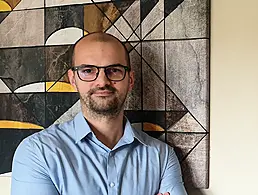Dr Bruno Voisin and Dr Orna Fennelly share why they chose to work in high-performance computing research at ICHEC.
While many of us work with computers in our daily lives, high-performance computing takes that to a whole other level.
We spoke to two people at Ireland’s Centre for High-End Computing (ICHEC), based at NUI Galway, to learn more about careers in the field.
Dr Bruno Voisin is ICHEC’s data science lead where he delivers projects across data management, statistical analysis, machine learning and more.
Dr Orna Fennelly is an e-health researcher at the centre, which sees her contribute to the development of a proof-of-concept technical infrastructure for safe and secure access to health data for research.
‘Working in this industry is extremely rewarding as you get to tackle global challenges and societal issues’
– ORNA FENNELLY
What experiences led you to this job and to ICHEC? Did you always want to work in this area?
Voisin: I studied computer science in college and completed my PhD in 2002 with an astronomy laboratory, doing applied machine learning (then called data mining) on astronomical data. This led me to a postdoc in NUI Galway with the Computational Astrophysics Laboratory.
As the recession made it difficult for astronomical research funding, I applied to the recently founded ICHEC, which was looking for data management and analytics skills to work with humanities. So I spent a few years working on digital humanities, broadening my data type horizons. Then the dramatic rise of AI technologies (hardware and software) brought machine learning to the forefront of high-performance computing and settled my role.
When I originally did my PhD, I wanted to teach computer science and a lectureship looked like the best way to achieve that. However, applied research grew on me right from my PhD with astronomers, and this kept going as my project partners diversified at ICHEC.
Dr Bruno Voisin. Image: ICHEC
Fennelly: Having completed my physiotherapy degree and subsequently a PhD in health service research, I started a postdoc working on a number of HSE health informatics projects. These experiences heightened my interest in how large amounts of routinely collected health data can be used to improve healthcare. Being able to share my knowledge and expertise of the health service and health data with computer scientists and developers in a collaborative environment made ICHEC very attractive to me.
When I completed my physiotherapy degree, I knew that I wanted to work in the area of health service development and improvement. However, it was the advances in digital health and the growing importance of big data and AI in healthcare that later motivated me to work in this exciting and rapidly developing area.
Dr Orna Fennelly. Image: ICHEC
In your opinion, what are the most valuable skills for working in high-end computing right now? What about in the future?
Voisin: I would say it’s the ability to learn. All our activities, be they code optimisation, scaling code for massively parallel execution or AI model development and deployment, rely on fast-moving technologies. We regularly have to learn new languages, libraries and understand research papers for new techniques we want to apply to a project.
For a less generic answer though, for high-performing computing, I’d say you want a solid grasp of at least one of our key programming languages (C/C++, Python, Fortran) as well as common parallel programming libraries (MPI, OpenMP). Further skills would depend on your specific area of interest, and could include CUDA programming or AI frameworks (PyTorch, TensorFlow).
Fennelly: Apart from the technical skills, I think the ability to collaborate with people from different sectors and understand their requirements is an extremely valuable skill for a career at a centre like ICHEC that provides services to universities, the public sector and private industry.
Now and in the future, high-performance computing is becoming more important to the sectors that traditionally didn’t require that level of computing power or high-performance data analytics. Having people working in high-end computing that can engage and adapt to the needs of different stakeholders from a variety of sectors is very beneficial.
Why did you decide to apply your skills to public sector research?
Voisin: For me, it was originally a natural progression, going from a PhD to starting a research career, to finding myself in an applied research role at ICHEC. By then, I had found that this is my ideal middle ground; I get to apply my skills to real problems, but without the narrower and long-term context of a specific company. This means working with Irish research groups, European research consortiums, public sector bodies, start-ups, multinationals. It is enriching from a personal perspective, and few industry jobs would provide me with such a broad scope.
In addition, as part of its public sector mission, ICHEC provides me with the opportunity to teach. This is as much formal lectures to students as public sector training sessions or private industry courses. I get to not only apply my knowledge in high-performance computing technologies, but also to transfer that knowledge to the people and businesses who can make use of it.
Fennelly: For me, working in a public organisation means that the projects that I’m involved in are in the public interest and include tackling major societal challenges, supporting impactful research, accelerating economic development and advancing digital skills.
I find working in a job where I am passionate about the outputs is extremely motivating. I also like the autonomy, variety and flexibility it affords me. I have the opportunity to continue to develop my research career with publications, committees and training at NUI Galway, while also working with private industry and building a network in this area.
Is a career in high-performance computing research rewarding?
Voisin: I enjoy the breadth of projects I get to work on. We have a wide variety of partners with different needs and as technology evolves, so do our projects. There is always something new to learn, something new to experiment with, and we get to do this on computing hardware that is generally out of reach of most users.
But more than that, my main enjoyment is the applied nature of our work. Because we are a service, we get approached by a wide range of partners who all have specific needs. And this gets me to apply the science I was fascinated with in the first place.
During my studies, I loved the concepts behind machine learning and data mining, but was never satisfied with the toy datasets I got to use. I guess I was more into using the technology than inventing it. In the high-performance computing industry now, I get to put all those AI technologies to use in order to solve real problems, and I have access to a wide range of high-end hardware.
Fennelly: Working in this industry is extremely rewarding as you get to tackle global challenges and societal issues. I really enjoy working on varied and different projects where you can see the real-world impact of the research or the infrastructure or product being developed. It is also very exciting working at the cusp of technological and computing advances.
Would you recommend a career in this area of research to others?
Voisin: Yes, for people who are after working with high-end hardware and are interested in keeping up with the technological developments. This can be both a career choice (as in my case), or a stepping stone into the industry. Our applied research projects have proven a fantastic source of experience for junior staff who later decided to move to the private sector after having developed their high-performance skills on real data.
Fennelly: From my experience, many new graduates or postdocs are unsure whether they would like to work in research or move to private industry. I would recommend ICHEC to anyone in this position as it offers an excellent opportunity to build your research portfolio and keep up to date with technological advances.
I would advise that anyone interested in working in this area contacts any employee at ICHEC (via LinkedIn or Twitter). Everyone at ICHEC is very approachable and happy to help. Most people working at ICHEC have very different backgrounds as well, so there is no single entry point.




